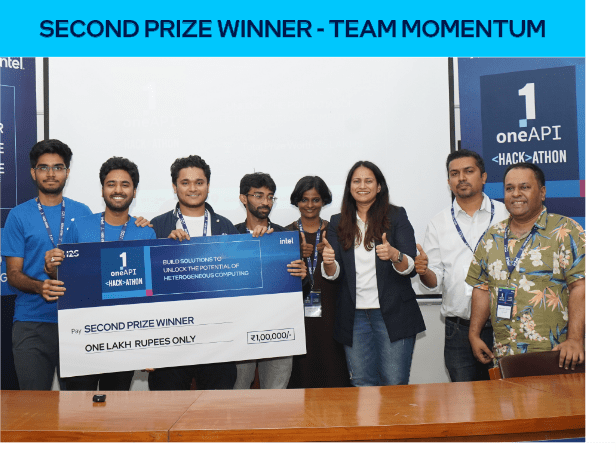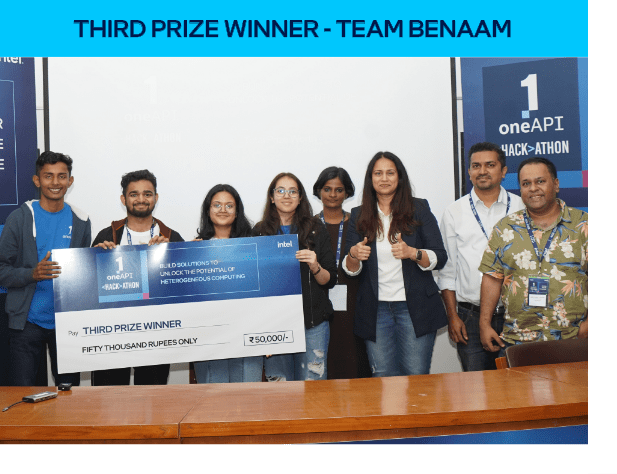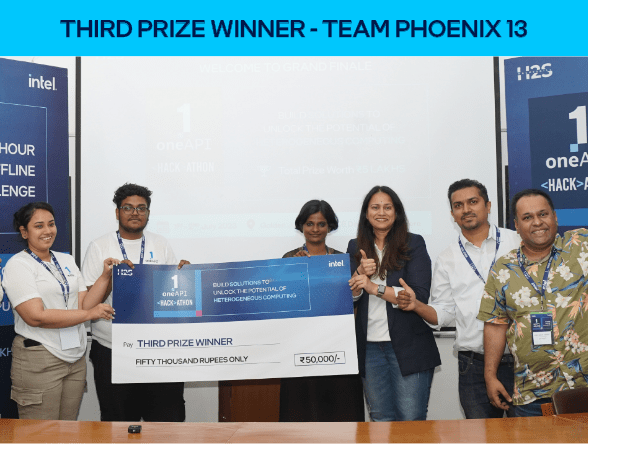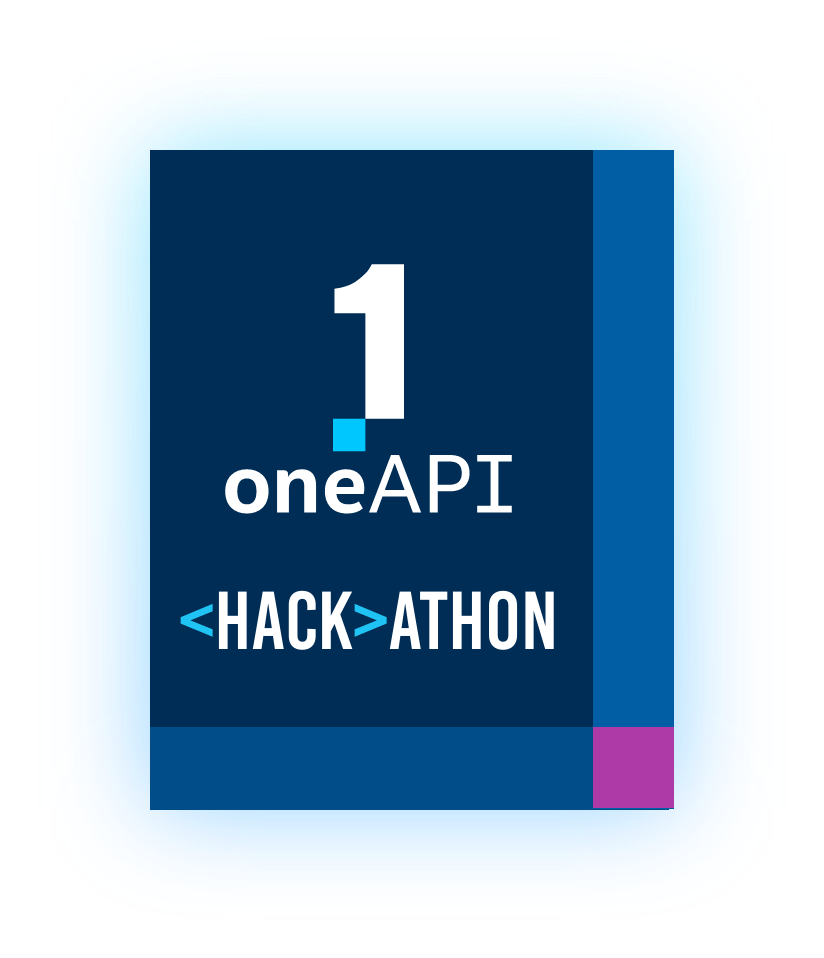Build Solutions to Unlock the Potential of Heterogeneous Computing
Registrations ClosedPrize money worth ₹5 Lakhs
Who can participate?
Professionals, Developer Communities, AI/ML Enthusiasts, Ph.D. - First Year Students/ M.Tech students working along with their professors, research scholars, start-ups, and freelancers.
Last Date To Register 7th May 2023
Offline
1-4
India
Registrations Closing in :
Registrations ClosedAbout
The Intel® oneAPI Hackathon is a 30-hour offline hackathon that challenges developers to showcase their expertise in building innovative solutions for the social good through heterogeneous computing, using Intel® oneAPI as the primary programming model.
During the hackathon, participants will have the opportunity to receive hands-on training from Intel® experts on various Intel® AI Analytics Toolkits, its libraries and SYCL/DPC++ Libraries, making it easy for them to learn and work with industry-standard, Intel® optimized frameworks such as TensorFlow, PyTorch, Scikit-Learn, XGBoost, open AI software tools, and domain-specific reference kits.
Participants will be required to use Intel® oneAPI and heterogeneous computing to build real-world solutions using machine learning techniques and the SYCL Programming model. The objective of the hackathon is to encourage Tech Scholars & Professionals to build solutions using the Intel® AI Analytics Toolkits, its libraries and SYCL/DPC++ Libraries
Intel® oneAPI Hackathon is open to all and will be happening at the Indian Institute of Sciences (IISC) in Bengaluru, India. Participants will be competing in teams to demonstrate their working prototypes created over the course of the hackathon, solving the challenges using Intel® oneAPI. The hackathon offers cash prizes worth ₹5 Lakhs for the top-performing teams.
Participate in the Intel® oneAPI Hackathon and be part of a community of innovators, building solutions that make a difference!
Hall of Champions




RUNNERS UP
BYTE404
ALPHA TRIBE
SNEAKYTURTLE
CHHOTA BHEEM
VIOLAX
AI ARTISTSS
OXYGEN
MIND CRUSADERS
PRESERV
Neural Knights
Hackathon Phases
PHASE - 1
Idea Submission - In a PPT format, converted into PDF
This will be the ideation phase of the hackathon where participants shall brainstorm their ideas for the given problem statements and submit innovative solutions to their chosen problem statements using Intel® AI Analytics Toolkits, its Libraries and SYCL/DPC++ Libraries
PHASE - 2
Prototype Development - Creation of Prototype & Code submissions in GitHub repository
In this phase, the participants will be working towards building their prototype and will be attending mentor hours taken by industry experts and professionals from Intel®. By the end of this phase, they will have to submit their prototype codes in the Final Submission.
PHASE - 3
30 Hour Offline Hackathon
The shortlisted participants after making their final submissions, will be invited to fine tune their prototype with the help of the hackathon mentors and present it in front of an esteemed Jury Panel on the hackathon days of 1st & 2nd of July
Timeline
Launch & Registration Phase
Registrations Open
4th April 2023
Idea Submissions Open
8th April 2023
Hands-On Workshop 1 (Accelerate AI workloads with Intel® oneDNN & oneDAL)
19th April 2023
Hands-On Workshop 2 (Solving Operating System Concepts with SYCL)
26th April 2023
Registrations Close
7th May 2023
Idea Submissions Close
7th May 2023
Post Registration
Initial Shortlist Announcement
19th May 2023
Induction Session
22nd May 2023
Prototype Development Phase
Prototype Development Phase Begins
19th May 2023
Mentor Session On Intel® AI Analytics Toolkits
24th May 2023
Mentor Session On SYCL/DPC++ Libraries
25th May 2023
Prototype Development Phase Ends
09th June 2023
Final Submissions
09th June 2023
Finale
Final Shortlist Announcement
21st June 2023
Hack in 30, Day - 1
01st July 2023
Hack in 30, Day - 2
02nd July 2023
Rules
Deliverables - Idea Submission Phase
-
Participants must strictly engage in the use of Intel® AI Analytics Toolkits, its Libraries & SYCL/DPC++ Libraries while framing their ideations.
-
The ideations of the participants must be compiled in the form of a Powerpoint Presentation (PPT) converted into a PDF format for submission
-
A sample template for idea submission will be given to the participants in their hackathon dashboard, all the points mentioned in the template should strictly be covered in their submission.
-
Link of the GitHub repository will be given to the participants in their hackathon dashboard
-
Participants will be required to fork this repository and update the README file, filling in the required details.
-
To avoid disqualification, participants must submit their ideas in the hackathon dashboard before the deadline i.e. 7th May 2023
Deliverables - Prototype Development Phase
-
The prototype submission should be made on a GitHub public repository.
-
The entire code base needs to be present on the team's GitHub repository.
-
The prototype submission must lay down equal emphasis on the deployment/inference benchmarking for both, with and without Intel® oneAPI
-
Pull requests of the forked repository need to be generated
Note : Participants can update the README file in their forked repository, in the prototype development phase as well in order to reflect their changes. The GitHub repositories must be retained throughout the process, even after the winner announcement.
Judging Criteria
Code Quality - 33.33%
-
Code is easy to understand and is reproducible
-
Code is well tested, and functions without errors
-
Code is well documented
Technical Implementation - 33.33%
-
Intel® AI Analytics Toolkits, its Libraries and SYCL/DPC++ Libraries are leveraged and used appropriately by developer
-
Data Preprocessing and Exploratory Data Analysis (EDA)
-
Model Training and Inference
-
Implementation of Intel® oneAPI is a must
Creativity & Originality - 33.33%
-
Solution is original and clearly differentiates itself from submissions in the same category
-
Solution creates clear additional value beyond competition
-
Scale and novelty of technology
Problem Statements
1 - Object Detection For Autonomous Vehicles
The challenge is to develop a real-time object detection model for autonomous vehicles using computer vision techniques and Intel® AI Analytics Toolkits its libraries, and SYCL/DPC++ Libraries . Participants are expected to create a deep learning model that can accurately detect objects such as pedestrians, vehicles, traffic signs, and traffic signals. The model should perform with high accuracy and low latency, ensuring safe navigation for autonomous vehicles.
End Goal
-
Develop a deep learning model using Intel® AI Analytics Toolkits its libraries, and SYCL/DPC++ Libraries to detect objects on the road, with a focus on accuracy and speed.
-
Test the model on a dataset that includes real-world scenarios, including various weather conditions, lighting conditions, and road environments.
-
The solution should be able to prevent load shedding by providing timely alerts to energy providers to take necessary action to prevent power grid overload.
-
Optimize the model for low latency to enable real-time object detection in autonomous vehicles.
-
Provide a comprehensive report detailing the approach, methodology, results, and challenges faced during the development and testing of the model.
Note: It is mandatory to use the Intel® AI Analytics Toolkits, its Libraries and SYCL/DPC++ Libraries for the solution. Leverage the libraries for maximum efficiency...
2 - Medical Image Processing
Processing medical images can be time-consuming, especially when dealing with large datasets. Therefore, the challenge is to optimise medical image processing using SYCL to improve the accuracy and speed of diagnosis.
End Goal
The end goal is to build a medical image processing application that demonstrates the performance benefits of using SYCL for parallel computing. The application should process medical images faster and with higher accuracy than existing medical imaging applications.
-
Use SYCL's parallelism capabilities to speed up medical image processing.
-
Improve the accuracy of diagnosis through efficient feature extraction from medical images.
-
Benchmark the application against existing medical imaging applications in terms of performance, accuracy, and scalability.
-
Use a publicly available medical imaging dataset, such as the NIH Chest X-ray dataset or the BraTS dataset for brain tumour segmentation.
3 - Open Innovation in Education
The education sector is facing numerous challenges in the wake of the COVID-19 pandemic. One of the major challenges is the need for innovative solutions to address the disparities in student learning outcomes and to ensure equitable access to quality education. To tackle this challenge, we are calling for an open innovation challenge that leverages the Intel® AI Analytics Toolkits, its libraries and the SYCL/DCP++ Libraries to develop innovative solutions that can improve student learning outcomes and promote equitable access to quality education.
End Goal
-
The ultimate goal of this open innovation challenge is to create innovative solutions that leverage the Intel® AI Analytics Toolkits its libraries and the SYCL/DCP++ Libraries to improve student learning outcomes and promote equitable access to quality education.
Note: To achieve optimal performance and better models, it is required to use the Intel® AI Analytics Toolkits its libraries and the SYCL/DCP++ Libraries in the development of the interactive educational platform. Therefore, participants are advised to leverage the libraries and optimizations provided by oneAPI to enhance the efficiency of the application.
Training & Hands-on Workshops
Accelerate AI workloads with Intel® oneDNN & oneDAL
19th April 2023
5 - 7 PM
Solving Operating System Concepts with SYCL
26th April 2023
5 - 7 PM
Hackathon Resources
Toolkits & Libraries
Videos
Hackathon Jury
Usha Rengaraju
Chief of Research, Exa Protocol

Usha Rengaraju
Chief of Research, Exa Protocol
Usha currently heads the data science research at Exa Protocol, and she is the World’s first women triple Kaggle Grandmaster. She is ranked as top ten Data Scientists in India for the year 2020 by Analytics India Magazine, ranked as the top ten women data scientists by Analytics Insight magazine for 2021, and also ranked as the top 150 AI Leaders and Influencers by 3AI magazine. She organized NeuroAI which is India’s first-ever research symposium on the interface of Neuroscience and Data Science. She also organized the Neurodiversity India Summit which is India’s first-ever conference in Neurodiversity.
Abhishek Nandy
Co-Founder - Dynopii

Abhishek Nandy
Co-Founder - Dynopii
Abhishek Nandy is a co-founder of Dynopii an AI Voice based startup and currently part of it.Abhishek is also an Intel register trademark Certified trainer with Intel® oneAPI SYCLspecialization. Abhishek brings in a mixture of experience, research aptitude and large industry exposure. He is an entrepreneur, a teacher, author, researcher and dreamcatcher. He has worked on various domains such as pharmaceutical, manufacturing and retail and has led several teams in research and product development.
Kavita Aroor
Developer Marketing Lead, APJ - Intel®

Kavita Aroor
Developer Marketing Lead, APJ - Intel®
Kavita Aroor is a Developer Marketing Lead- APJ at Intel® focusing on developing software solutions for the Asia Pacific market. She drives the developer outreach, engagements and programs in the areas of GPU, HPC and AI. With 18 years of experience in brand and field marketing, Kavita has driven numerous customer and user engagements across the Asia Pacific
Anish Kumar
AI Software Solutions Engineering Manager APAC, Intel®

Anish Kumar
AI Software Solutions Engineering Manager APAC, Intel®
Anish Kumar is a seasoned AI professional, currently leading the AI Solution Engineering for the APAC region at Intel®. With nearly two decades of experience in the technology industry, Anish brings a wealth of knowledge and expertise to his role. He assists mission-driven organizations in maximizing their impact through the use of data science and machine learning that are optimized using Intel® AI toolkits and Intel® hardware.
Prizes
2nd Place Winner
₹ 1,00,000/-
1st Place Winner
₹ 1,50,000/-
3rd Place Winner
₹ 50,000/-
Next Top 10 Teams
₹ 20,000/-
Winners of social contest will receive exclusive Intel® Goodies!


















 Certificates for all Valid Idea Submissions
Certificates for all Valid Idea Submissions